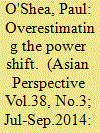| Srl | Item |
| 1 |
ID:
148058


|
|
|
|
|
| Summary/Abstract |
The Bay of Bengal is of vital strategic, economic and maritime importance, as the Andaman Sea and the Malacca Straits link South and Southeast Asia. The Bay is intrinsically rich in hydrocarbons and minerals. Several major rivers of Asia flow into the Bay and the adjoining seas creating vast sedimentary basins that have potential hydrocarbon deposits. The growing role of the Bay of Bengal as a reservoir of vital resources has contributed to the regional powers’ ability to exert influence in this arena. The changing dynamics are particularly relevant for India and China, whose rising economies are dependent on the steady flow of resources, most importantly oil. The geopolitics of the increasingly volatile South China Sea could possibly impact on India’s interests and relations with Southeast Asian countries. This paper examines whether China and India’s Indian Ocean strategies underpin greater cooperation, rather than competition to generate synergies in the region.
|
|
|
|
|
|
|
|
|
|
|
|
|
|
|
|
| 2 |
ID:
133968


|
|
|
|
|
| Publication |
2014.
|
| Summary/Abstract |
In 2009 the Democratic Party of Japan came to power promising a foreign policy shift, aiming for a more equal relationship with the United States and improved relations with Japan's Asian neighbors. The policy shift was explicitly designed as a response to a perceived regional and global power shift from the United States to China. However, within nine months the new prime minister, Hatoyama Yukio, resigned, and his successors jettisoned the foreign policy shift. Conventional explanations cite the weak leadership of Hatoyama, the inexperience of his party, and the lack of realism behind the proposed policy shift itself as key factors in the shift's failure. In this article I provide an alternative perspective. Drawing on the concept of discursive power, I demonstrate how Washington turned the Futenma base relocation and other issues into a major crisis in Japan-US relations in order to discredit Hatoyama and the policy shift. What was arguably a modest and pragmatic policy shift was narrated as a grave threat to the very cornerstone of postwar Japanese security. By focusing on the US exercise of discursive power over Japan, I suggest that talk of an East Asian power shift is premature.
|
|
|
|
|
|
|
|
|
|
|
|
|
|
|
|
| 3 |
ID:
151726


|
|
|
|
|
| Summary/Abstract |
The East Asian region is in flux with the rapidly increasing rise of Chinese power and the perception of a relative decline of US influence. For US treaty allies in the region, the challenges to its regional dominance by a rising China have posed dilemmas but also opportunities. No country better exemplifies this contrast than South Korea, which as a middle power finds itself in a precarious position in the regional hierarchy. In recent years, South Korea has responded with new approaches to foreign and security strategies, which are the product of several factors: the challenges wrought by China's growth, US attempts to meet this challenge with a rebalance toward the region, and South Korea's evolving perceptions of national security. My discussion concludes that while external factors have shaped South Korea's security transformation, internal factors have been just as important drivers of South Korea's foreign policy.
|
|
|
|
|
|
|
|
|
|
|
|
|
|
|
|